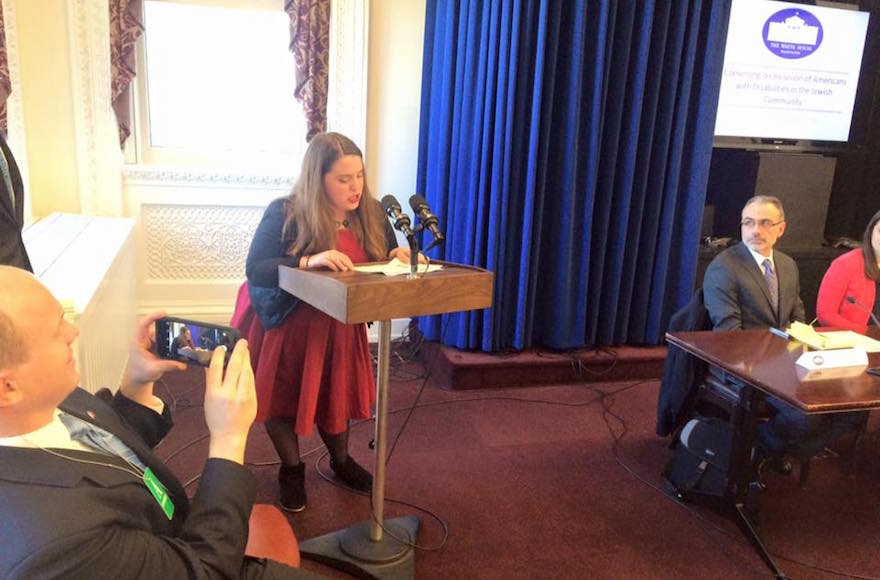WASHINGTON (JTA) – Jewish advocates for the disabled briefed Obama administration officials on barriers to Jewish life for those with disabilities.
The two-hour event Thursday was organized by the White House and held at the neighboring Eisenhower Executive Office Building as part of Jewish Disability Awareness and Inclusion Month, an initiative of a number of local and national Jewish organizations.
Matt Nosanchuk, associate director and liaison to the Jewish Community at the White House Office of Public Engagement, and Maria Town, associate director and liaison in the disability community in that office, moderated the discussion.
Judith Heumann, the special advisor for International Disability Rights in the Department of State, cited tikkun olam, the ancient rabbinical imperative to repair the world, and said: “The Jewish community has an obligation, I believe, to be leaders.”
When a building is not accessible and there are no braille reading materials or sign language interpreters, those with a disability get the message they are not welcome, said panelist Ruti Regan, co-founder of Anachnu, a group promoting inclusion within the Jewish community.
Along with Regan, the panel included Sheila Katz, vice president for social entrepreneurship at Hillel International; Aaron Kaufman, senior legislative assistant at Jewish Federations of North America, and John Winer, the executive director at the Jewish Association for Developmental Disabilities.
In attendance among others were representatives of RespectAbility, an advocacy group that has been canvassing presidential candidates about how their platforms address the needs of the disabled.
Jennifer Laszlo Mizrahi, RespectAbility’s president, said the event was an opportunity for networking and sharing best practices for a cohort scattered throughout the country.
“It’s an ingathering of the leaders around the country doing exemplary work but who don’t get enough time to network,” said Mizrahi, whose group advocates for greater inclusion within the Jewish community.
The panelists addressed the need for inclusion not just in programming and services but also in Jewish social life.
“No individual wants to feel like they are a chesed project,” Winer said, using the Hebrew word for charity.
Kaufman said inclusion is important, but added that events designed for the disabled can also be salutary. Kaufman, who is in a wheelchair and has cerebral palsy, said he had a great experience on a recent Birthright trip to Israel designed for disabled people.
He urged everyone working on inclusion to include people with disabilities in their meetings. “Nothing about us without us,” he said. It is also important to realize the costs of making a synagogue, organization or event totally inclusive, he said.
“Everybody can say, ‘Oh, we are all created in the image of God,’ and that’s wonderful, but if they are really serious, they have to be willing to put money to it,” Kaufman said.
Katz of Hillel said she would like to see more Jewish leaders talk about their own disabilities and become role models. It’s important to reach out to those with disabilities and “meet you wherever you are on your Jewish journey. We have a responsibility,” she said.
“The best mosaics are made up of the most beautiful pieces,” Winer said, noting, that should be “the fabric of our Jewish life.”
JTA has documented Jewish history in real-time for over a century. Keep our journalism strong by joining us in supporting independent, award-winning reporting.






